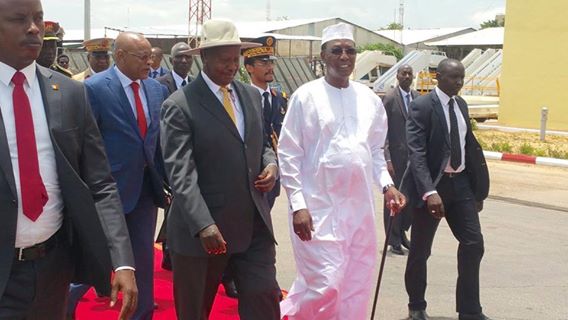
N’Djamena, Chad | AFP |
Chad’s President Idriss Deby, who began his fifth term in office Monday, is a warrior leader who seized power in a military coup in 1990 and is today set on crushing African jihadists.
After 26 years as ruler of the vast African country, Deby took around 60 percent of the votes in a first round ballot in April.
While his supporters celebrated by shooting into the air in the capital N’Djamena, the opposition cried fraud. Saleh Kebzabo, Deby’s main foe, officially took just under 13 percent of the vote.
Prior to Deby’s swearing-in, opposition activists announced they had filed a complaint in court alleging “high treason” against him, claiming “illegal taking of power by violence” and “misuse of public money”.
Dressed in robes, military uniform or suits, his gaze concealed by dark glasses, the current African Union chief enjoys international standing, largely due to the role played by his formidable army in fighting Islamic extremists.
Newly acquired oil money helped to equip the troops who repulsed jihadists in north Mali in 2013 alongside French troops, then stepped in to end chaos in the Central African Republic in 2014 – until Deby withdrew soldiers accused of atrocities against civilians.
Early in 2015, Deby launched a regional offensive in Cameroon, Nigeria and Niger against Nigeria-based Boko Haram jihadists, dubbing the Islamic State affiliate “a horde of crazies and drug addicts”.
A Muslim, like some 53 percent of Chadians, Deby’s contribution to the fight on terror has won him support in the West.
‘A key man’
But at home, where the regime arrested rights activists and banned opposition rallies ahead of the polls, Deby has left many of Chad’s 13 million people deep in poverty despite the oil wealth.
Deby, who is 64, has a firm ally in former colonial power France, which in 2008 helped him defeat rebels who came from Sudan to reach N’Djamena — just as he had in 1990 when he ousted Hissene Habre, his former boss.
“He’s a key man,” said a senior French official speaking on condition of anonymity, adding that in the turbulent central African region, “he’s one of a few who have a vision”.
But his opponents in N’Djamena argue that Western powers should pay more attention to Deby’s failings on both the political and economic scene.
Opposition leader Kebzabo, who fell out with Deby after serving as prime minister, wants Chad’s “economic partners, particularly France, to be more and more insistent on economic governance, respect for human rights.”
Deby was born in 1952 at Berdoba in northeastern Chad to a family in the Zaghawa ethnic group, a branch of the Gorane people who live both sides of the border with Sudan.
In a country where scores of languages are spoken, Deby has surrounded himself with close ethnic kin and runs “a regime that has forced the population into increasing impoverishment,” Kebzabo says.
Backdrop of protest
Like many other ambitious young Africans, Deby first chose the life of a soldier, enrolling at the N’Djamena officers’ academy and later obtaining a pilot’s licence in France.
He backed fellow soldier Habre in a power struggle in a single-party state, ousting president Goukouni Weddeye in 1982. The new leader made him military commander-in-chief.
As a warrior leader, Deby’s renown grew in battle with rebels backed by Libyan leader Moamer Kadhafi, who contested Chad’s rule over mountainous northern territory.
Deby fell out with Habre in 1989 and ended up in Sudan, raising his own army, which toppled Habre the following year.
On May 30, Habre was sentenced to life in jail for war crimes and crimes against humanity by a special African court in Senegal.
Six years after he seized power and ushered in democracy, Deby was elected head of state in Chad’s first multi-party vote.
While he was challenged at the polls in 1996 and 2001, the main opposition decided to withdraw its participation in 2006 and 2011, irked by a change to the constitution enabling the former soldier to renew his term. They also decried massive fraud.
The April election came against a backdrop of unprecedented protest, fuelled by the gang-rape of a schoolgirl, for which seven sons of Chadian officials were sentenced to 10 years in jail each in July.
 The Independent Uganda: You get the Truth we Pay the Price
The Independent Uganda: You get the Truth we Pay the Price





